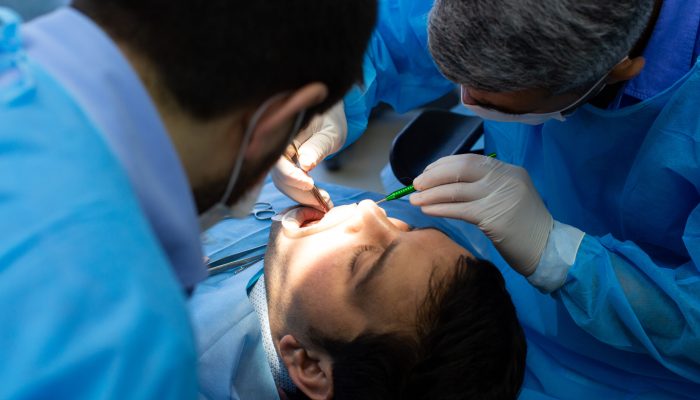
Third molar
Wisdom teeth, also known as third molars, are the last set of teeth to emerge in the back of the mouth. While some lucky individuals have no issues with their wisdom teeth, many experience complications that necessitate their removal. If you're considering wisdom teeth removal, embark on a journey to a healthier smile as we delve into the benefits and considerations of this common dental procedure.
What is the process of Wisdom Tooth Surgery?
Wisdom tooth surgery is a minor yet precise surgical procedure performed to extract a wisdom tooth safely. To ensure your comfort, local anesthesia is administered to the specific area requiring extraction. If the wisdom tooth is partially erupted or buried beneath the gum line, small incisions may be necessary to facilitate its removal. However, in some cases, the dentist can extract the wisdom tooth cleanly without the need for incisions. The approach taken during the procedure is determined based on a thorough examination and evaluation of X-rays conducted during the initial consultation.
What methods are available to ensure a pain-free wisdom tooth surgery?
Wisdom tooth surgeries are typically performed under local anesthesia, which effectively numbs the surgical area and minimizes pain during the procedure. However, for patients who are particularly sensitive to pain or feel anxious about the surgery, there is an alternative option. Qualified specialists can administer general anesthesia, allowing patients to sleep comfortably throughout the procedure and ensuring a pain-free experience.
How safe is the wisdom tooth surgery procedure?
Extensive research has demonstrated that wisdom tooth surgery is a highly safe and straightforward procedure. By conducting a thorough examination and analyzing X-rays, dentists can accurately plan and perform the surgery with predictable outcomes. X-rays are essential for assessing the position of the wisdom tooth and its proximity to the nerve in the lower jaw. This information is crucial as compression of the nerve can lead to temporary numbness in the lower lip. While there may be some common post-operative discomfort, such as mild pain, bleeding, and swelling lasting a day or two, dentists prescribe appropriate painkillers and medications to manage pain and promote healing.
Potential complications
Like any surgical procedure, there are risks associated with wisdom tooth removal. These risks include infection or delayed healing, which are more likely if you continue to smoke during your recovery period.
Another potential complication is the development of “dry socket,” characterized by a dull, aching sensation in the gum or jaw area, as well as a possible unpleasant taste or odor originating from the empty tooth socket. The risk of dry socket is increased if you do not follow the after-care instructions provided by your dentist.
Additionally, there is a small chance of nerve damage, resulting in tingling or numbness sensations in the tongue, lower lip, chin, teeth, and gums. While this is typically temporary, in rare cases, it can lead to permanent effects.

